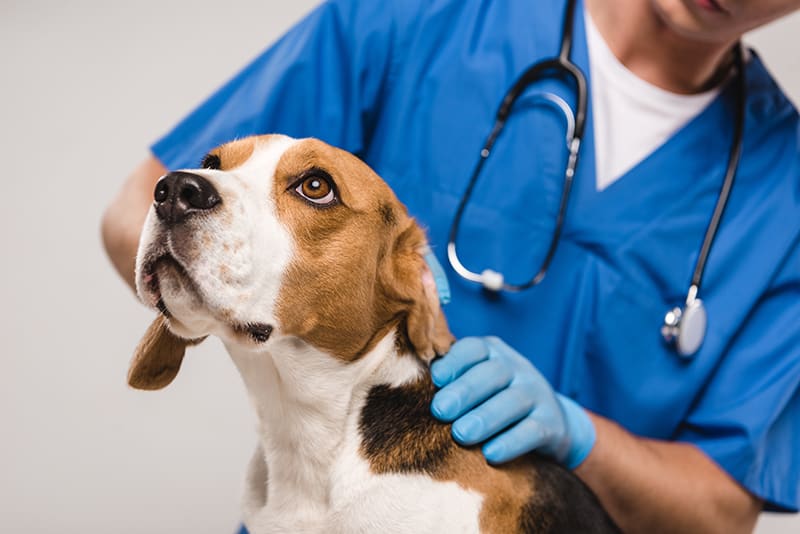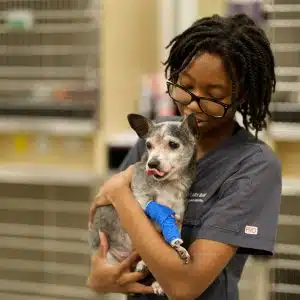Comprehensive Overview to the Providers Used by a Vet Oncologist
Veterinary oncology encompasses a broad variety of services targeted at dealing with and detecting cancer cells in pet dogs. Veterinary Oncologist. Oncologists use advanced analysis strategies and provide different therapy choices tailored to each pet's requirements. They likewise focus on helpful care and provide important resources for animal owners. Comprehending these solutions is essential for making educated decisions. What details aspects of vet oncology can significantly influence a pet dog's treatment journey?
Understanding Vet Oncology
Vet oncology is a specific field concentrated on dealing with and detecting cancer cells in animals. This self-control includes a large range of strategies, from medical treatments such as chemotherapy and immunotherapy to surgical interventions focused on removing lumps. Vet oncologists are educated to identify the unique symptoms of cancer cells in various species, enabling them to customize treatment strategies to individual clients.
In enhancement to conventional treatments, vet oncology emphasizes encouraging treatment, which plays a necessary function in improving the top quality of life for damaged animals. This includes discomfort administration, dietary support, and palliative treatment alternatives. Partnership with pet owners is important, as they are essential to decision-making regarding their animals' treatment courses. As study developments, veterinary oncology remains to evolve, using new hope and enhanced results for pet dogs identified with cancer. Overall, this area is fundamental for attending to the complexities of cancer cells in companion animals.
Advanced Diagnostic Techniques
Advanced diagnostic methods play a vital role in vet oncology, supplying essential insights into the existence and degree of cancer cells in animals. Imaging techniques such as ultrasound, CT scans, and MRI are frequently utilized to picture tumors and evaluate their attributes. Furthermore, biopsy procedures are necessary for obtaining tissue examples, enabling clear-cut medical diagnosis and customized therapy plans.
Imaging Modalities Utilized
Imaging modalities play an important function in the medical diagnosis and monitoring of cancer cells in pets. Veterinary oncologists utilize numerous innovative imaging techniques to analyze lump presence, transition, and dimension. Radiography, or X-rays, provides an initial sight of bone and upper body conditions, while ultrasound provides real-time imaging of soft cells, enabling thorough analysis of inner body organs. Computed tomography (CT) boosts visualization of intricate physiological structures and makes it possible for 3D restorations, helping in exact lump localization. Magnetic vibration imaging (MRI) is very useful for soft cells distinction, specifically in brain growths. Furthermore, nuclear medicine strategies such as positron exhaust tomography (FAMILY PET) help identify metabolic activity within tumors. Jointly, these modalities improve analysis precision, guiding reliable treatment strategies for oncological people.
Biopsy Treatments Clarified
Adhering to the first evaluation via imaging modalities, acquiring a definitive medical diagnosis typically requires tissue sampling through biopsy procedures. Veterinary oncologists utilize various biopsy strategies based upon the tumor's area and characteristics. Fine needle aspiration (FNA) is a minimally intrusive method that removes cells for cytological evaluation, perfect for superficial masses. Core needle biopsies offer bigger cells samples and work for much deeper growths, permitting for histopathological evaluation. Surgical biopsies entail excising a section or the whole growth, facilitating extensive evaluation. These treatments not only verify the visibility of cancer yet also assist identify its kind and quality, guiding therapy decisions. Each biopsy strategy is selected very carefully to stabilize diagnostic precision with person safety and security and convenience.
Therapy Choices for Cancer Cells in Family pets
When a pet dog is detected with cancer, a variety of treatment choices become offered to help handle the disease and enhance lifestyle. Vet oncologists typically suggest a multidisciplinary technique tailored to the specific family pet's needs, which might include surgery, radiation treatment, immunotherapy, or alternate therapies.
Surgical treatment is typically used to eliminate lumps and afflicted cells, possibly causing full remission sometimes. Radiation therapy aims to target and destroy cancer cells, reducing lump size and relieving signs and symptoms - Board Certified Veterinary Oncologist. Immunotherapy utilizes the pet dog's body immune system to eliminate cancer cells better, while alternate therapies may include acupuncture or herbal supplements to support overall health and wellness
Each treatment option lugs its very own benefits and risks, and vet oncologists function carefully with pet dog proprietors to design a thorough plan that lines up with the pet dog's specific medical diagnosis and the proprietor's dreams. The best objective is to enhance the pet's comfort and lifestyle throughout their cancer trip.
Radiation treatment for Pets
Chemotherapy is a common treatment choice for pet dogs identified with cancer cells and is frequently made use of in conjunction with other therapies described by vet oncologists. This therapy entails the management of specific medications made to target and damage cancer cells, therefore lowering tumor size and stopping the spread of the condition. Veterinary oncologists tailor chemotherapy methods based upon the sort of cancer cells, the pet dog's total wellness, and the wanted therapy result.
Negative effects can happen, as these medications might likewise impact healthy and balanced cells. Common responses consist of nausea or vomiting, throwing up, and short-term changes in hunger - Veterinary Cancer Specialist. Veterinary oncologists are equipped to handle these negative effects properly, guaranteeing the pet dog's convenience throughout the treatment process. Routine monitoring via blood examinations and follow-up appointments is necessary to evaluate the pet dog's action to chemotherapy and make necessary adjustments. Inevitably, chemotherapy can provide considerable benefits, enhancing the quality of life for pets encountering cancer diagnoses

Radiation Therapy in Veterinary Medicine
Radiation therapy serves as an efficient therapy choice for pet dogs diagnosed with local tumors, supplying a targeted strategy to cancer cells administration. This technique uses high-energy radiation to harm the DNA of cancer cells, hindering their capability to proliferate. It is specifically beneficial for tumors that are not amenable to medical removal or for instances where surgical procedure may not be viable because of the lump's location.
Vet oncologists tailor radiation procedures based on growth type, dimension, and location, in addition to the pet's general health. Therapy can be delivered via outside beam radiation or brachytherapy, each with unique advantages. Commonly, numerous sessions are called for to optimize effectiveness while decreasing side effects.
Animals might experience short-term responses such as skin inflammation, the general objective is to diminish growths and alleviate signs, eventually enhancing the pet dog's prognosis and quality of life. Accordingly, radiation treatment plays a necessary function in detailed cancer cells care.
Palliative Treatment and High Quality of Life
Palliative treatment in vet oncology concentrates on boosting the top quality of life for pet dogs encountering incurable health problems, making sure convenience and self-respect in their final days. This customized technique focuses on pain management, sign control, and emotional support. Veterinary oncologists assess each animal's specific demands, customizing treatments to alleviate discomfort and boost total wellness.
Strategies might consist of carrying out medicines for pain relief, managing nausea, and dealing with other stressful symptoms. In addition, nutritional assistance is often given to keep stamina and improve cravings. The psychological element of palliative care is just as crucial; creating a calm setting assists reduce anxiousness for both family pet and owner.
Ultimately, the objective of palliative care is to permit family pets to appreciate their staying time with as much joy and dignity as possible. By concentrating on comfort and top quality of life, vet oncologists play a necessary role in guaranteeing that pets and their family members browse this difficult journey with concern and understanding.
Assistance for Pet Owners Throughout Therapy

Emotional Advice for Owners
Charting the psychological landscape throughout a family pet's cancer therapy can be an overwhelming experience for owners. The unpredictability surrounding medical diagnosis and prognosis can bring about feelings of unhappiness, vulnerability, and anxiety. Vet oncologists identify the value of psychological support and frequently give assistance to aid owners browse this difficult journey. Communication is crucial; talking about therapy choices and potential outcomes can alleviate some anxieties. Additionally, providing peace of mind that psychological responses are legitimate fosters a supportive atmosphere. Lots of oncology facilities might likewise recommend support system or therapy solutions customized for pet owners, assisting in common experiences. Urging proprietors to focus on self-care throughout this moment is important, as their emotional wellness directly influences their animal's comfort and general treatment experience.

Resources and Educational Products
Steering with the complexities of an animal's cancer therapy can be frightening for proprietors, making access to trustworthy resources and educational materials essential. Vet oncologists often give a selection of handouts, brochures, and online products that describe treatment options, possible adverse effects, and treatment approaches. These sources help empower and debunk the process pet dog owners to make educated decisions. Additionally, lots of oncology clinics supply access to sustain online forums and teams where owners can get in touch with others dealing with comparable difficulties, fostering a feeling of community. Educational webinars and workshops carried out by veterinary experts further improve understanding, guaranteeing that owners are fully equipped to navigate their family pet's journey via cancer therapy with confidence and knowledge.
Often Asked Questions
Exactly How Can I Prepare My Pet for a Veterinary Oncology Browse Through?
Preparing an animal for a vet oncology go to entails celebration medical records, keeping in mind symptoms, and making certain the animal is comfy. A tranquil attitude and acquainted items can assist ease stress and anxiety throughout the visit.
What Are the Indicators My Pet May Have Cancer?
Indications that a pet dog might have cancer cells include unusual weight reduction, consistent vomiting or diarrhea, uncommon lumps or swellings, sleepiness, modifications in hunger, trouble breathing, and changes in actions. Prompt vet interest is essential.
Exactly How Can I Support My Animal Mentally Throughout Treatment?
Supporting an animal psychologically throughout treatment includes giving convenience, maintaining routines, providing gentle affection, and guaranteeing a calm atmosphere. Taking part in peaceful play and regular friendship helps ease anxiety and promotes a complacency.
Are There Different Treatments for Family Pets With Cancer?
Alternative treatments for pet dogs with cancer cells consist of acupuncture, natural treatments, and dietary support. These approaches might enhance standard treatments, promoting overall health. Consulting with a vet is essential for efficient and risk-free combination of alternate therapies.
What Costs Should I Anticipate for Vet Oncology Providers?
The awaited prices for veterinary oncology services can differ substantially, frequently influenced by diagnostics, treatments, and ongoing care. Animal owners ought to plan for expenditures ranging from examinations to specialized treatments, mirroring the complexity of cancer administration.
Cooperation with pet dog owners is vital, as they are indispensable to decision-making concerning their pet dogs' treatment paths. Each treatment choice brings its own benefits and dangers, and veterinary oncologists function carefully with pet proprietors to create an extensive plan that aligns with the pet dog's certain diagnosis and Veterinary Cancer Specialist the owner's desires. Pet dogs might experience momentary responses such as skin irritation, the overall goal is to reduce tumors and relieve symptoms, ultimately enhancing the pet dog's prognosis and quality of life. Support for family pet proprietors throughout treatment is important in guiding through the emotional challenges connected with a pet's cancer cells medical diagnosis. Preparing an animal for a veterinary oncology visit entails event medical documents, keeping in mind signs, and making certain the animal is comfortable.